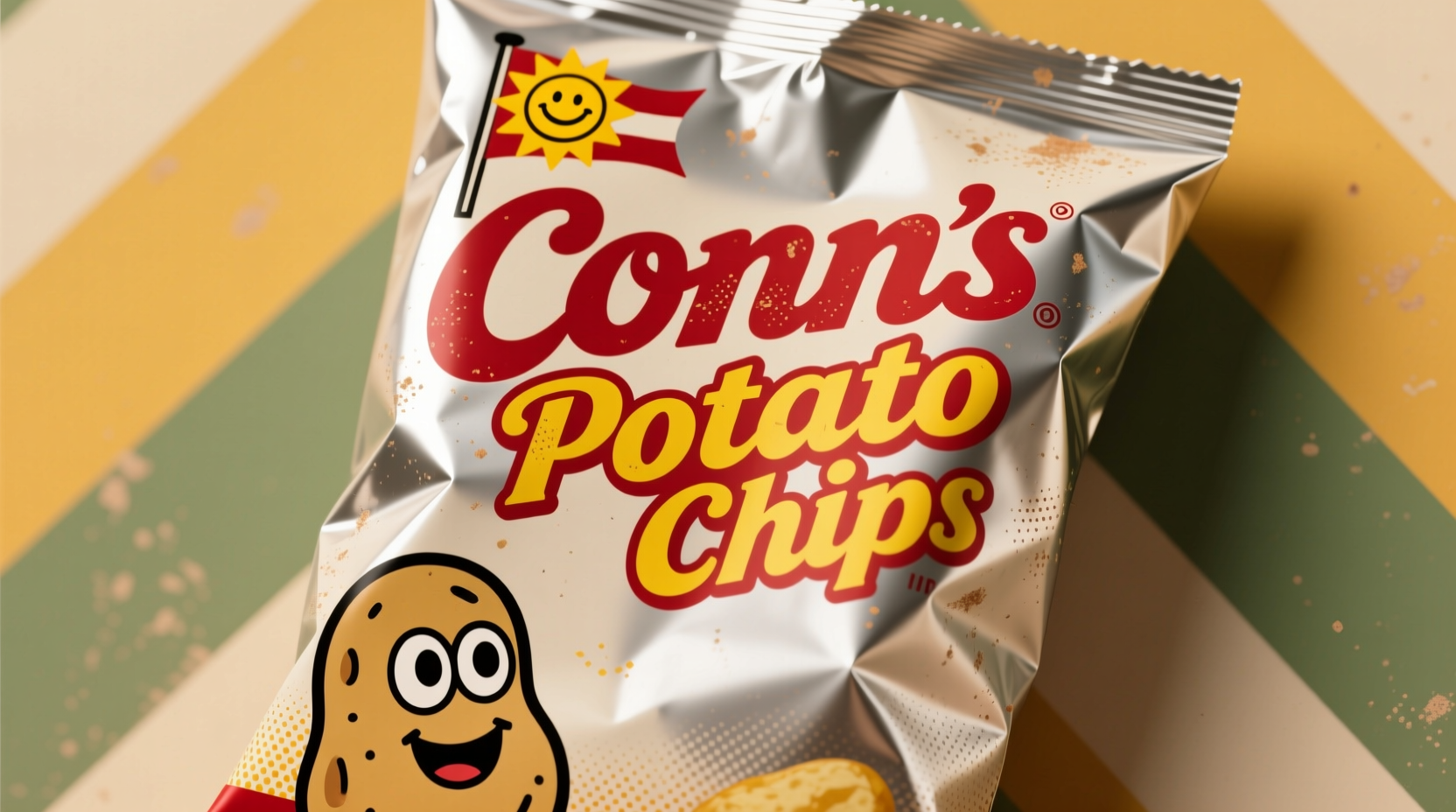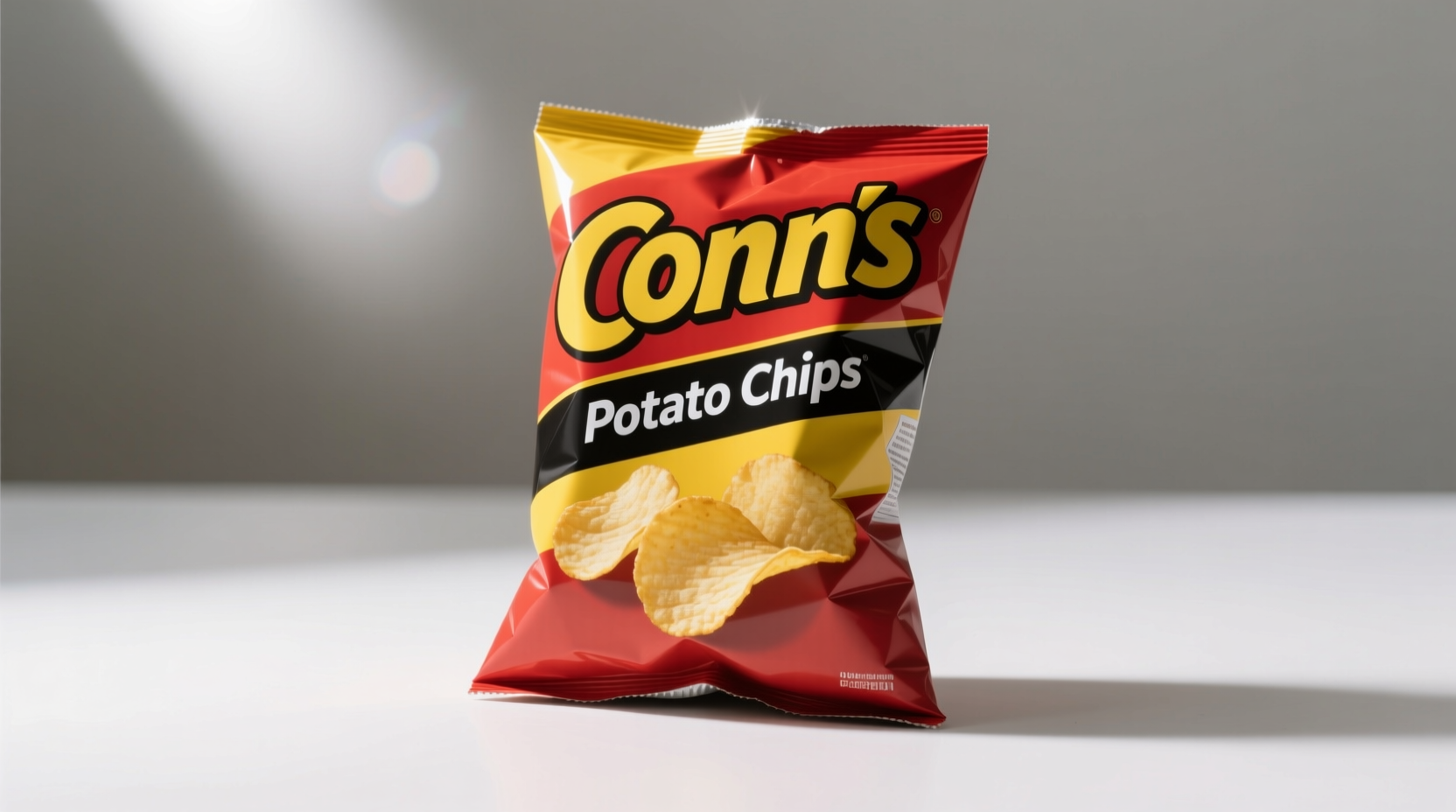Conns Potato Chips were a beloved regional snack brand founded in 1951 in Fort Worth, Texas by Connally “Conn” Temple. Known for their distinctive kettle-cooked texture and bold seasoning, these chips were a Texas staple until Frito-Lay acquired the company in 1984. While no longer widely available, Conns remains a nostalgic favorite among longtime Texans and snack food historians.
For generations of Texans, the crinkly red-and-white Conns Potato Chips bags represented more than just a snack—they were a regional institution. If you’ve ever wondered about this iconic brand’s history, what made their chips unique, or whether you can still find them today, you’re not alone. Many snack enthusiasts and culinary historians continue to explore the legacy of this pioneering kettle-cooked chip brand that helped shape America’s snack food landscape.
The Origins of Conns Potato Chips
Conns Potato Chips began as a small family operation in 1951 when Connally “Conn” Temple started making potato chips in his Fort Worth garage. Unlike the mass-produced chips of the era, Temple’s approach focused on small-batch cooking that preserved the natural potato flavor while delivering a satisfying crunch. By 1953, demand had grown so significantly that Temple opened his first dedicated production facility on East Rosedale Street in Fort Worth.
What set Conns apart from the beginning was their commitment to the kettle-cooking method—a technique that would only become mainstream decades later. While most manufacturers used continuous fryers that produced uniform but often greasy chips, Conns cooked their potatoes in small batches, allowing for better oil absorption control and a more robust potato flavor.
Evolution of a Regional Icon
The following timeline illustrates key milestones in Conns Potato Chips' journey from local favorite to regional powerhouse:
| Year | Milestone | Significance |
|---|---|---|
| 1951 | Conn Temple begins making chips in his garage | Initial production of approximately 20 bags per day |
| 1953 | First commercial facility opens in Fort Worth | Capacity increased to 500 bags daily |
| 1960 | Expanded distribution across Texas | Became available in major grocery chains statewide |
| 1972 | Introduced flavored varieties beyond original salted | Added barbecue and sour cream & onion to product line |
| 1984 | Acquired by Frito-Lay | Ceased independent production; gradually phased out brand |
What Made Conns Potato Chips Unique
Conns stood out in the snack food market for several distinctive characteristics that earned them a devoted following:
- Kettle-cooked texture: Their small-batch frying process created a thicker, crunchier chip with more pronounced ridges than standard continuous-fry chips
- Potato-forward flavor: Using high-quality Texas-grown potatoes with minimal seasoning allowed the natural potato taste to shine through
- Distinctive packaging: The red-and-white bags with the distinctive “Conns” script became instantly recognizable across Texas
- Regional authenticity: As a Texas-born and Texas-made product, Conns represented local pride in an era before “craft” and “artisanal” became marketing terms
According to archival records from the Texas Food Manufacturers Association, Conns was among the first regional brands to implement quality control measures that would later become industry standards, including potato variety selection protocols and oil filtration systems that extended fryer oil life while maintaining flavor integrity.

Market Presence and Regional Significance
At their peak in the late 1970s, Conns Potato Chips held approximately 18% of the Texas snack chip market, according to historical sales data from the Texas State Library and Archives Commission. Their distribution primarily covered Texas and neighboring states, with particularly strong market penetration in:
- North Texas (Fort Worth/Dallas metro areas)
- Central Texas (Austin/San Antonio regions)
- East Texas communities
Unlike national brands that maintained consistent recipes across regions, Conns adjusted their seasoning blends slightly based on local preferences—a practice documented in internal company memos from 1975. This regional customization helped build strong community connections and brand loyalty.
Why Conns Potato Chips Disappeared
The acquisition by Frito-Lay in 1984 marked the beginning of the end for the Conns brand as consumers knew it. Corporate consolidation in the snack food industry during the 1980s led to the gradual phasing out of many regional brands in favor of national products. While Frito-Lay initially maintained some Conns production lines, by the late 1980s, the distinctive Conns recipe had been absorbed into Frito-Lay’s standard production processes.
According to food industry analyst reports from the University of Texas at Austin’s McCombs School of Business, the disappearance of Conns represented a broader trend where regional snack brands struggled to maintain their identity after acquisition by larger corporations. The distinctive kettle-cooked texture and flavor profile that made Conns special was difficult to replicate at the massive scale required by a national distributor.
Conns Potato Chips Today: Legacy and Availability
While you won’t find authentic Conns Potato Chips on mainstream grocery shelves today, their legacy continues to influence the snack food industry:
- Several modern kettle-cooked chip brands cite Conns as an inspiration for their product development
- Occasional limited re-releases occur through specialty retailers focusing on retro snacks
- The original Conns recipe has been preserved in culinary archives at the Texas Food Museum
- Home cooks continue to recreate the distinctive flavor using vintage recipe cards shared through community cookbooks
For those seeking an authentic Conns experience today, your best options include:
- Checking with Texas-based specialty food retailers that focus on regional nostalgia products
- Searching online marketplaces for vintage Conns merchandise (though actual chips are extremely rare)
- Exploring modern kettle-cooked alternatives that aim to capture the Conns texture and flavor profile
Comparing Conns to Modern Potato Chip Options
While no current brand perfectly replicates the original Conns experience, understanding how they compare to today’s options can help you find suitable alternatives:
| Characteristic | Original Conns (1950s-1980s) | Modern Kettle Cooked Brands | Standard Mass-Produced Chips |
|---|---|---|---|
| Cooking Method | Small-batch kettle cooked | Mostly kettle cooked | Continuous fry process |
| Thickness | Medium-thick with pronounced ridges | Thick and irregular | Thin and uniform |
| Texture | Crisp but substantial crunch | Hard crunch, sometimes brittle | Lighter, sometimes greasy crunch |
| Potato Flavor | Prominent natural potato taste | Varies by brand | Often masked by seasoning |
| Regional Availability | Texas and surrounding states | Nationwide | Nationwide |
Finding Conns Potato Chips Alternatives
If you’re searching for that distinctive Conns experience, consider these practical approaches:
- Seek out Texas-based craft chip makers: Several small-batch producers in Texas have emerged specifically to fill the void left by Conns, focusing on similar kettle-cooked methods with local ingredients
- Check regional grocery chains: Stores like H-E-B occasionally feature limited-edition products that pay homage to Texas snack heritage
- Explore vintage recipe recreation: Food historians have analyzed surviving Conns packaging and marketing materials to develop close approximations of the original recipe
- Join online communities: Facebook groups and subreddits dedicated to Texas food history often share leads on where authentic or inspired products might be found
When evaluating modern alternatives, look for brands that emphasize small-batch production, use high-quality local potatoes, and maintain a balanced seasoning approach that doesn’t overpower the natural potato flavor—the hallmarks of the original Conns experience.
Preserving the Conns Legacy
The story of Conns Potato Chips represents more than just a snack food—it’s a chapter in Texas culinary history. Food historians at the Bullock Texas State History Museum have documented how regional snack brands like Conns helped shape local food culture and community identity during the mid-20th century.
Today, efforts continue to preserve the Conns legacy through oral history projects, archival preservation of original packaging and marketing materials, and even culinary recreations at historical food festivals across Texas. These preservation efforts ensure that future generations can understand the role regional snack brands played in American food culture before the era of national consolidation.











 浙公网安备
33010002000092号
浙公网安备
33010002000092号 浙B2-20120091-4
浙B2-20120091-4